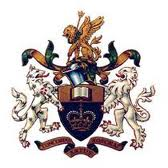Royal College of Defence Studies
 | |
Former names | Imperial Defence College |
|---|---|
| Motto | "To prepare senior officers and officials of the United Kingdom and other countries and future leaders from the private and public sectors for high responsibilities in their respective organisations, by developing their analytical powers, knowledge of defence and international security, and strategic vision." |
| Type | Senior Military College |
| Established | 1927 |
Parent institution | Constituent college of the Defence Academy of the United Kingdom |
| Commandant | Sir Tom Phillips |
| Students | Max. 90 |
| Location | , 51°29′56.91″N 0°9′5.12″W / 51.4991417°N 0.1514222°W |
| Campus | Urban |
| Website | www.da.mod.uk/colleges/rcds |
The Royal College of Defence Studies (RCDS) instructs senior officers of the Armed Forces and Civil Service in defence and international security matters at the highest level, to prepare them for the top posts. It forms part of the Defence Academy of the United Kingdom. There are many overseas attendees.
History
In 1922 a cabinet committee under Winston Churchill, then Secretary of State for the Colonies, recommended the formation of the College.[1] The college was founded in 1927 as the Imperial Defence College and was located at 9 Buckingham Gate until 1939.[1] Its objective at that time was the defence of the Empire.[1] In 1946, following the end of World War II, the college reopened at Seaford House, Belgrave Square and members of the United States forces started attending courses.[1] It was renamed the Royal College of Defence Studies in 1970 and in 2007 the Queen and Prince Philip visited the college.[1]
RCDS Course
The RCDS Mission is:
- "To prepare senior officers and officials of the United Kingdom and other countries and future leaders from the private and public sectors for high responsibilities in their respective organisations, by developing their analytical powers, knowledge of defence and international security, and strategic vision".[2]
RCDS forms a part of the Defence Academy of the United Kingdom. In fulfilment of its mission, the college runs one course a year, from September to July.[3] Each course is attended by a maximum of 90 full-time members, around one-third from UK and two-thirds from overseas.[3] Attendees are military officers of Colonel/Brigadier or equivalent rank but also include civil servants, diplomats, police officers and representatives from the private sector.[3] All have been selected to attend the course on the strength of their potential to progress to a high position within their profession.[3]
The course composition has been progressively widened to include members from over 40 different countries.[3]
Since 2001, course members have to option to study in a joint programme that leads to a MA in International Security and Strategy from King's College London.[3][4]
Governance
The College is led by a Commandant, currently Sir Tom Phillips, a career diplomat and Middle East expert.[5]
Commandants
Alumni
References
- ^ a b c d e "History of the Royal College of Defence Studies". Royal College of Defence Studies. Retrieved 24 December 2011.
- ^ "College Mission". Royal College of Defence Studies. Retrieved 24 December 2011.
- ^ a b c d e f "Royal College of Defence Studies Handbook 2011" (PDF). Archived from the original (PDF) on 4 August 2013. Retrieved 24 December 2011.
{{cite web}}:|archive-date=/|archive-url=timestamp mismatch; 18 October 2011 suggested (help) - ^ "MA in International Security and Strategy". kcl.ac.uk.
- ^ "Sir Tom Phillips KCMG". The Von Hügel Institute. Retrieved 14 October 2014.
